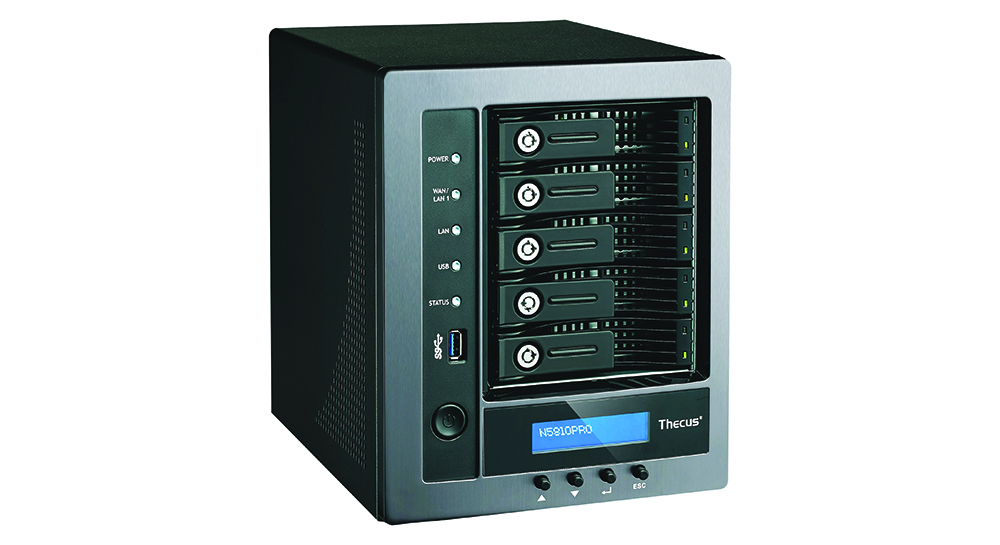Thecus N5810Pro Zero-Crash review
A reasonably priced NAS with power protection and good performance – but the feature set could be broader

The N5810Pro is good value, but its design and features didn’t impress. Even so, it delivers very good performance, and it’s your only option if you want a NAS appliance with its own UPS.
-
+
Built-in UPS guards against power failure; Good value
-
-
Outdated software; Unimpressive features;

It looks like a standard five-bay desktop NAS appliance, but the N5810Pro Zero-Crash has a secret: a mini-UPS to protect your data in the event of a power failure.
It's powered by a slim lithium-ion battery pack that fits into a slot at the rear; we found it stored enough juice to keep the appliance and four hard disks ticking over for almost five minutes. Before the pack is exhausted, the appliance gracefully powers itself off, ensuring your RAID arrays, outstanding disk writes and firmware upgrade manoeuvres remain intact.
The N5810Pro runs on Intel's popular 2GHz Celeron J1900 CPU, and the base 4GB of DDR3 RAM can be bumped up to 8GB. The metal cover isn't easy to remove, though, and when replacing it we found the plastic lever behind the power button obstructed the chassis, having to be coaxed into place with a thin piece of wire poked through the side air grille.
Installation was swift. The Setup wizard utility found the appliance on our network right away, and another wizard in the web console helped us create a RAID5 array from four 4TB WD Red hard disks. We were offered a choice of file systems, and opted for the newly supported BTRFS, so we could play with its snapshot feature.
Whereas Netgear's ReadyNAS boxes support unlimited BTRFS snapshots, Thecus only lets you retain up to 16 versions. They're easy to create, however: we selected shared folders and were able to run them manually or apply a daily, weekly or monthly schedule.
To test recovery, we selected a snapshot from the share list and suspended the SMB service. The appliance restored all our deleted files in less than a minute. Recovery can also be delegated to users; snapshots can be exposed as network shares and files restored using drag-and-drop.
The only glitch was with iSCSI snapshots. Although the console informed us these had completed successfully, when we looked in the list there was nothing there. After we raised this with Thecus, a firmware upgrade was provided that resolved the issues, allowing us to snapshot and recover iSCSI targets seamlessly.
Sign up today and you will receive a free copy of our Future Focus 2025 report - the leading guidance on AI, cybersecurity and other IT challenges as per 700+ senior executives
The appliance didn't disappoint for performance. Copying a 50GB test file to and from a network share, we saw average transfer rates of 112MB/sec and 109MB/sec. Our backup test folder, containing 10,500 small files, was also handled well, copying toa share at a speedy 88MB/sec.
With five Gigabit Ethernetports, the N5810Pro is well served for connectivity. To test its performance under pressure, we mapped dedicated shares to four different Windows Xeon E5-2600 servers, each connected to separate ports. Running Iometer on each one to measure raw read and write speeds, we saw cumulative rates of 452MB/sec and 410MB/sec.
Thecus supports real-time replication to other rsync-compatible appliances, so it can fit into all sorts of backup regimes. We tested this using the Data Guard app, which helped create scheduled backups to local storage, external USB devices and our Amazon S3 account.
Unfortunately, it supports few other cloud services: there are only apps for Dropbox and ElephantDrive. For Amazon Glacier, Google Drive, Box, Microsoft OneDrive and more plus local workstation cloud syncing features check out Synology or Qnap.
Thecus also bundles a five-user copy of Acronis True Image Personal 2010, which provides image-based workstation backup. It's so old, however, it should be in a museum. It also requires a paid-for upgrade to receive support for features such as incremental backups and job scheduling.
The N5810Pro is good value, but its design and features didn't impress. Even so, it delivers very good performance, and it's your only option if you want a NAS appliance with its own UPS.
This review first appeared in PC Pro magazine issue 252
Verdict
The N5810Pro is good value, but its design and features didn’t impress. Even so, it delivers very good performance, and it’s your only option if you want a NAS appliance with its own UPS.
Desktop chassis
2GHz Intel Celeron J1900
4GB DDR3 RAM (max 8GB)
5 x SATA hot-swap drive bays
Supports RAID0, 1, 5, 6, 10, JBOD
5 x Gigabit Ethernet
3 x USB3
2 x USB2
HDMI
Internal PSU
Li-ion mini-UPS
190 x 242 x 235mm (WDH)
Web browser management
2yr RTB warranty
Dave is an IT consultant and freelance journalist specialising in hands-on reviews of computer networking products covering all market sectors from small businesses to enterprises. Founder of Binary Testing Ltd – the UK’s premier independent network testing laboratory - Dave has over 45 years of experience in the IT industry.
Dave has produced many thousands of in-depth business networking product reviews from his lab which have been reproduced globally. Writing for ITPro and its sister title, PC Pro, he covers all areas of business IT infrastructure, including servers, storage, network security, data protection, cloud, infrastructure and services.
-
 European Commission clears Google’s Wiz acquisition, citing 'credible competition' from Amazon and Microsoft
European Commission clears Google’s Wiz acquisition, citing 'credible competition' from Amazon and MicrosoftNews Regulators said there are “several credible competitors” to Google regardless of the acquisition
By Ross Kelly Published
-
 EU inaugurates NanoIC facility for next-generation chips
EU inaugurates NanoIC facility for next-generation chipsNews The project forms part of efforts to reduce reliance on US and Asian supply chains
By Emma Woollacott Published
-
 European Commission confirms hackers breached mobile management platform
European Commission confirms hackers breached mobile management platformNews Security experts warned the breach could lead to follow-up phishing attacks
By Emma Woollacott Published
